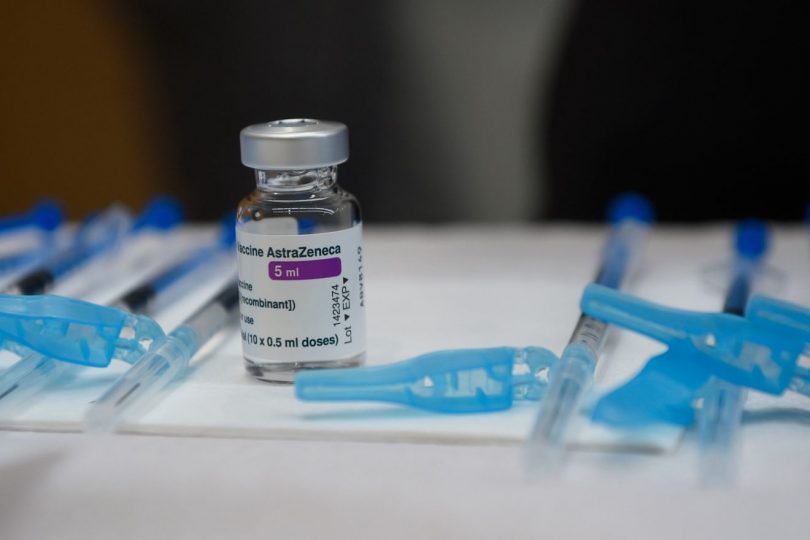The recent death of New South Wales’ Genene Norris has sparked an Australian frenzy surrounding the COVID-19 vaccines.
The 48-year-old’s passing came at a peak time of vaccine anxiety, with Norris’ death occurring due to a fatal blood clot. It proved to be the first death caused by the AstraZeneca variant of the coronavirus vaccination program, and caused a shift in rules regarding the future administration of the vaccine.

The AstraZeneca vaccine has caused controversy since arriving in Australian shores (Photo by Reuters)
One of two options originally shipped into Australian shores, the AstraZeneca vaccine was developed at the University of Oxford in England. Assumedly safe alongside the Pfizer option, the AstraZeneca variation of vaccine has quickly come under controversy. It all boils down to its side effects, which mainly includes the ability to cause blood clots.
The term created by these blood clots is thrombosis with thrombocytopenia syndrome, or TTS. Although not always serious, TTS has the ability to cause deadly blood clots that can cause life-threatening ailments just days or weeks after receiving a dose of the AstraZeneca vaccine.
But that doesn’t mean the AstraZeneca vaccine is unsafe to take.
Brett McLeod has been a reporter and journalist for Channel 9 News for decades, and is still adamant he will receive his AstraZeneca vaccine.
“I’ve always said that for me, as soon as the (AstraZeneca) vaccine started to become available overseas, I said I’ll get one as soon as I can,” McLeod said.
But it isn’t so easy for everyone.
Due to the death of Norris and a spate of other blood clotting incidents, the federal government swiftly changed the rules to only allow citizens over the age of 50 to receive the AstraZeneca vaccine. For those under the age limit, they would have to wait for the Pfizer option to become available.
Yet Luiga Calvisi, a 66-year-old Queensland resident, can’t get the AstraZeneca option. Calvisi has fibromyalgia, a medical condition that can cause auto-immunity, and has no other option but to isolate.
Despite being for vaccinations, she has had to come to the realisation that it isn’t safe for her to receive the AstraZeneca variant.
“I think if they had offered the Pfizer vaccine to everybody then I probably would’ve gone and had it done,” Calvisi said.
“It is just specifically the AstraZeneca option, and the fact that apparently it’s ok for over 50s but not under, which makes me no real sense to me.”
It’s a sentiment that rings true for older Australians since the over 50s limit came into place for the AstraZeneca vaccine.

The AstraZeneca vaccine has been dispersed throughout the world, including countries like Ireland (Photo by Miguel Riopa/ AFP via Getty Images)
In an Essential Report survey completed at the end of April, only 40 per cent of being between 50 and 69 were willing to get the AstraZeneca vaccine, with major reasons for the boycott being the blood clotting concerns.
But for Robert Booy, who is a professor of Paediatrics and Child Health at the University of Sydney, the risk of contracting TTS from the AstraZeneca vaccine is extremely minimal.
“If you contract COVID then you’re probably close to 10 times more likely to have a clot as a complication then if you have the vaccine, so it is much safer to be vaccinated than to have the disease,” Booy said.
For females, they have a one in 2,000 risk of having a serious clot while on the oral contraceptive pill, compared to a one in 200,000 risk when receiving the AstraZeneca vaccine.
This highlights how minimal the risk of experiencing a fatal blood clot is when having the vaccine done, but there’s one key question that has elderly Australians like Calvisi stumped – why is the age limit at 50?
It boils down to statistics and odds. Those over 50 have a higher risk of being seriously affected and even dying if they contract COVID-19, meaning they are one of the more vulnerable groups of Australians. They are a priority when it comes to vaccinating. Coupled with this is that people under 50 have a much higher chance of experiencing blood clots from medication, whether it be due to a lack of blood thinning medication or biological make-up.
This means that people in the most vulnerable age group of dying from COVID are receiving a vaccine they have incredibly low odds of experiencing TTS or serious blood clots from, lowering the risk of any side effects massively. It may not be nice to hear of the nasty side effects that come with the AstraZeneca vaccine, but it may just be the safest way forward.

